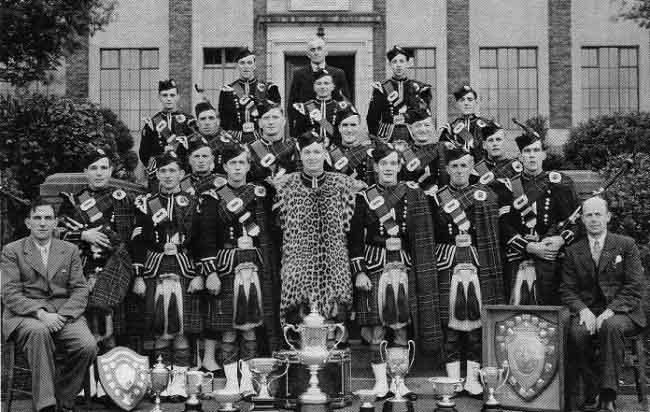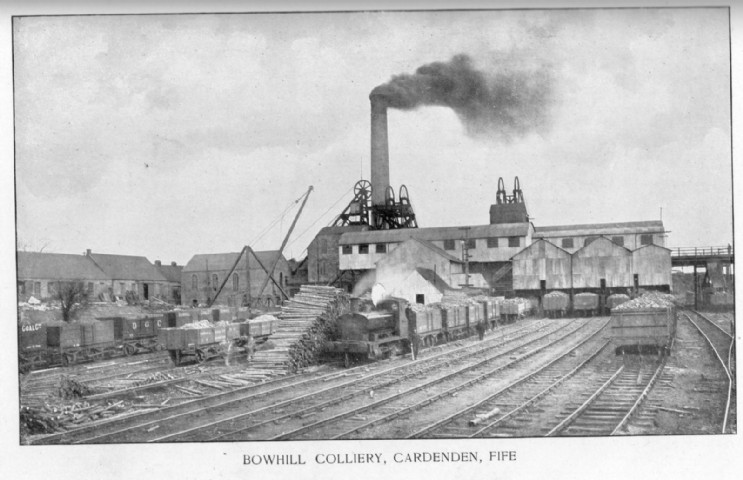Another custom chanter story . . . from 1960

The recent story of the courageous and determined piper, Andrew Shilliday, getting back on the full Highland pipes with the help of the folks at G1 Reeds reminded us of another story from 1960.
+ G1 helps to put Grade 1 piper back on the pipes
Back then, Chris Sutherland, the pipe-major of the Bowhill Colliery of Cardenden, Fife, faced his own challenge. Among their many awards, Sutherland had led Bowhill Colliery to win the first official World Pipe Band Championship, held in Edinburgh in 1947.
Until the 1980s, many coal mines, or collieries, in Scotland and Northern Ireland, sponsored pipe bands. Until the 1970s, many of the members of these bands would be miners themselves – one of the most dangerous occupations there is.
Community colliery bands were so prevalent that the RSPBA held a competition exclusively for them in conjunction with the annual Miners’ Gala celebration. Colliery-sponsored bands such as Shotts & Dykehead Caledonia, Woolmet & Danderhall, Dysart & Dundonald, Monktonhall Colliery, and Polkemmet Colliery would go head to head.

The decline of coal mining in the UK was hastened after the contentious country-wide miners’ strike of 1984, which pitted the hardscrabble workers against the Tory Prime Minister Margaret Thatcher, the notorious Iron Lady of British politics. Thatcher fought these proud working-class citizens tooth and nail over several months. Many of the mines flooded due to pumps being shut down. By the time the strike ended, it would have been too expensive to restart the mines, so most were simply shuttered, leaving thousands unemployed, the majority in Scotland and the north of England.
In 1959, Sutherland’s hand was crushed while working in the Bowhill colliery. Eventually, one of his fingers had to be amputated.
Similar to the folks at G1, Sutherland’s friend, Muirhead & Sons Pipe-Major Bob Hardie, owner of R.G. Hardie & Co., stepped up to make a special chanter that enabled Sutherland to get back on the pipes.
Sutherland lost his D finger – the pointer – on his right hand. Undeterred, he taught himself to play again, substituting the movement of his lost finger with his thumb. Hardie created a pipe chanter with the D hole on the back. Like Shilliday, Sutherland was able to continue to play and enjoy the music he loved to make.
Here’s a brief account of the accident from the online archives of the Central Fife Times.
5 Mar 1960 – Scattered all over the world are pipers who have been pupils of one of Scotland’s best-known Pipe-Majors, Mr. Chris Sutherland, of Bowhill Colliery Pipe Band. Yet in a few months’ time he will have the job of teaching perhaps the most difficult pupil he has ever had – himself.
In December, while he was at work as a deputy, Mr. Sutherland had his right hand on a piece of machinery when a lump of redd fell from the roof on to his forefinger. For the last three months, doctors and staff at the Kirkcaldy General Hospital have tried to save this finger which means so much to a piper. Last week, however, it was found necessary to amputate the finger.
Bowhill Colliery’s World Championship Pipe Band from 1947, with Pipe-Major Chris Sutherland standing at the extreme left of the front row. In later years, his son, Christopher (Chris) Clark Sutherland, would become a piper in the band.
We do not know if the chanter exists today, but if any readers might know of its location we would be pleased to hear from them.
Here’s an archive recording of the Bowhill Colliery Pipe Band in their prime.

Amazing story.
The other side to the tail is the colliery bands themselves. Until their demise, the colliery bands did much to teach, in our case, for free, and sustain piping through Fife, the Lothians and Ayrshire. It was a time pre-piping lessons in schools and limited tuition was available if budgets were tight. Other names from the past include Bilston Glen, Killoch Colliery, Lady Victoria, Kelty and Blairadam as well as Bowhill, to name a few I remember from the 70’s. I remember as a 12 or 13 year old the long march from London road and down to Holyrood Park for the contest, and as a colliery band there were many more parades to come, in parallel to the business of competing.